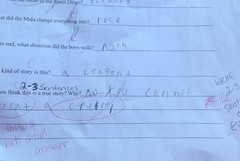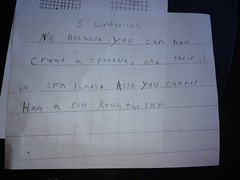The early elementary school years are about "learning how to learn." Strategies on how to read or count, because yes there is more then one way. As a new parent I didn't know what's job was when my older son started bringing school work home. I is find myself getting frustrated when he didn't complete worksheets correctly, or if he didn't understand a concept quickly or "get it." I am embarrassed because I feel I should've known better. But how? Or why would I know? No one taught me. So I am also "learning to learn how to help my kids" with their school work an what's expected.
What is Homework?
My husband and I discussed early on what our "job is as parents is" when it comes to school work. Just because he is a Principal doesn't always mean we have thought through our parenting role. Or that we agree on our roles... so we discuss, plan, reflect and readjust as needed.
Homework, in our home, in these early years means we are learning how to work hard at our school work. Mom included. Homework is not about being easy, or hard, it is about the time it takes to complete the work. About the steps involved in completing homework (sharpening your pencil, not wanting to do it when you have to, using an I-pad or book for research, etc.). Homework is "hard work" sometimes and that's okay, he is learning perseverance in times of, well... laziness.
What is Homework?
My husband and I discussed early on what our "job is as parents is" when it comes to school work. Just because he is a Principal doesn't always mean we have thought through our parenting role. Or that we agree on our roles... so we discuss, plan, reflect and readjust as needed.
Homework, in our home, in these early years means we are learning how to work hard at our school work. Mom included. Homework is not about being easy, or hard, it is about the time it takes to complete the work. About the steps involved in completing homework (sharpening your pencil, not wanting to do it when you have to, using an I-pad or book for research, etc.). Homework is "hard work" sometimes and that's okay, he is learning perseverance in times of, well... laziness.

My son brought home his reading test with a love note for his teacher. "This is not a full answer." However to my frustration she didn't review with him what a FULL ANSWER IS. So in turn, that's my job, the parents job is to reinforce ideas the child is and is not learning. And while I feel that a "complete answer" should be reviewed in class, I am happy to do it as best I can at home. Not perfect, but the best I can do.
So when we finished homework assignments that night, I had one more assignment for my son to do.
1. Read the instructions (or in this case the message from the teacher): I read to my son what the teacher had written.
2. Check for Understanding: Then I asked him did he understand what the teacher meant? "Can you tell me what a full answer is?" He said no.
3. Explain the Idea (explain what needs to be learned as best you can, simply...) I explained, again, with out being upset or frustrated because THIS IS MY PARENTING JOB what a full answer is. "A Complete or Full Answer is when you write down on the paper everything in your brain about the questions. How does the teacher know what's in your brain if your don't write it down?" We reviewed that he should write 2 - 3 sentences about the question, and suddenly he remembered learning how to write a "short answer" in class.
4. Do the work! Even though my son didn't want to, when he saw me drawing with a ruler the lines on the back of his page, "Mom, what are you doing?"
I said "I would like you to write the answer correctly."
"But mom I don't have to, we don't have to correct our test, it doesn't count."
Ha! He is still learning how "moms way" works. I said you need to "learn from his mistake. Making mistakes is important, that's how our brains learn. But we need to correct our mistakes when we can so our brain re-learns the correct way. Start Writing."

How to Help with Homework, School Strategies, a photo by areyousureaboutthatblog on Flickr.
In this photo you can see I drew three lines WITH A RULER (my son hates - or is lazy - about using his tools) so he can rewrite at home the proper answer that's "in his head." The next time he drew the lines, I cannot do this "work" for him.
The story the class read for the test was fresh in his mind. Even if we would have done this activity 1 or 2 days after the test, he would have been able to complete it. My son did have three ideas about the story he read. And he wrote three sentences (which he remembered was the maximum, "two is the minimum, mom"). If my son would not have remembered the story, I probably would've read him a short story and made up a question for him to answer. He still needed to DO the work.
5. Review The Work. We reviewed what he wrote. I asked him if he liked his new answer.
5a: Ask about their emotional state (this helps kids build confidence and make them feel good about learning and relearning from mistakes!). How did it make him feel? "Like I am smart." I said I felt "like you CAN show your teacher what is in your brain."
6. Review the old and new work. Compare them. I read him his old answer and the new answer, and I asked him which one he liked best. He preferred the three sentences.
Learning from our mistakes IS one way to learn. As a parent I feel we just need to review school work and try to reinforce the ideas when papers come home with 100% or less. Homework is about doing the work not just about the grade.
No, my son did not have to turn in our correction - the purpose of this lesson was to learn how to do things correctly, not about the credit.
Make Mistakes. Breath, Reflect. and Laugh.Out.Loud
No comments:
Post a Comment